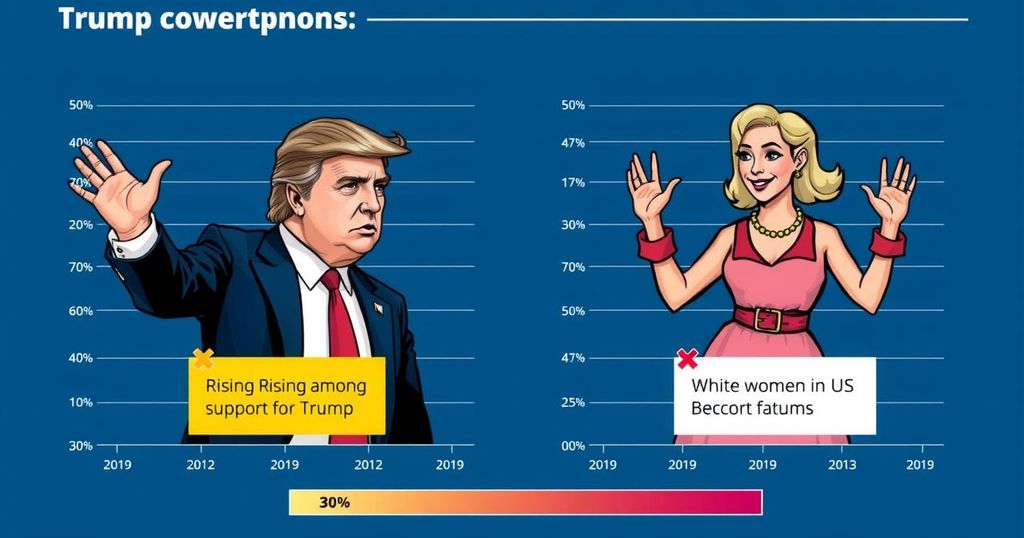The Gender Dynamics of the 2024 Election: Understanding Trump’s Appeal Among Men and the Shift Among Women

Donald Trump leads Kamala Harris by eleven percentage points among male voters, with significant support from Hispanic and African-American men, despite his controversial rhetoric. Young men increasingly favor Trump, aligning with conservative values amid societal pressures surrounding masculinity. Conversely, Trump faces declining support from women, especially following reproductive rights issues, demonstrating a notable gender gap in the electoral landscape.
In the current political landscape, Donald Trump appears to hold a significant advantage over Kamala Harris among male voters, leading by eleven percentage points per a recent New York Times poll. This trend underscores a notable support base among American men, which extends beyond traditional demographics. While white men remain a core element of Trump’s constituency, he has successfully appealed to Hispanic-American and African-American men as well. Disregarding Trump’s controversial rhetoric regarding immigration and race, approximately half of Hispanic men perceive him as sufficiently assertive for presidential leadership. Interestingly, surveys indicate that about twenty-five percent of African-American men under fifty are inclined to support Trump. A substantial portion of his backing stems from younger men who gravitate towards the Republican party, particularly those aged eighteen to twenty-nine, a demographic previously leaning Democratic under President Biden. This shift can be partly attributed to a generational pivot among young men toward conservative values, as opposed to the progressive ideals increasingly embraced by young women. The appeal of Trump to younger men may also be a reflection of societal pressures surrounding masculinity. As more American men express a desire for increased representation and validation within society, Trump’s straightforward and unapologetic demeanor resonates with their frustrations. Research indicates that a significant number of men who find Trump appealing perceive a mismatch between societal expectations of masculinity and their lived experiences—often considered a concept tied to the fragile masculinity hypothesis. This phenomenon distinguishes male support for Trump from the support seen for previous Republican candidates like Mitt Romney and John McCain. Additionally, young men’s engagement with Trump is characterized by a perception that women’s advances pose threats to their social standing. Poll data further suggests that a considerable portion of Trump supporters holds the belief that women have progressed at the expense of men—this sentiment is especially pronounced among younger male voters. Conversely, Trump’s support among women, particularly white women, has experienced a notable decline. This deterioration can be significantly attributed to the divisive nature of his rhetoric towards women and the ramifications of the Supreme Court’s 2022 decision to overturn Roe v. Wade, which emphasized reproductive rights. Although support for reproductive rights does not markedly differ between genders, it has proven to be a pivotal issue for women, further exacerbating female alienation from Trump’s camp. In 2024, Trump’s lead among white women has diminished to a mere one percentage point, a stark contrast to the seven-point advantage he enjoyed in previous elections. The contrasting communication styles of the candidates are likely to play a crucial role in determining electoral outcomes, leaving the political arena rife with questions surrounding gender dynamics and voter sentiments.
The article explores the evolving electoral landscape in the United States, focusing on Donald Trump’s appeal to male voters and the diminishing support he garners from women, particularly white women. Recent polling data illustrate a stark divide in support based on gender, highlighting a shift in the political allegiance of younger men toward conservative values. Additionally, the article delves into the societal implications of masculinity, the impact of rhetoric on electoral support, and the significance of reproductive rights in shaping voter behavior.
In summary, Donald Trump’s rising popularity among male voters, especially young men, intertwines with broader societal shifts around masculinity and conservative ideals. Despite making gains within these demographics, he faces challenges in maintaining support from women, who are increasingly mobilized by issues of gender equality and reproductive rights. The 2024 election underscores a critical juncture in American politics, where gender dynamics may heavily influence the electoral outcome.
Original Source: theconversation.com








